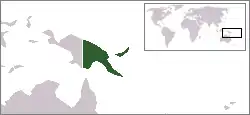LGBT rights in Papua New Guinea
Lesbian, gay, bisexual, and transgender (LGBT) persons in Papua New Guinea face legal challenges not experienced by non-LGBT residents. Male same-sex sexual activity is illegal, punishable by up to 14 years' imprisonment, but the law is not enforced.
 | |
| Status | Male illegal, female legal |
| Penalty | Up to 14 years' imprisonment (not enforced) |
| Gender identity | No |
| Military | No |
| Discrimination protections | No |
| Family rights | |
| Recognition of relationships | No |
| Adoption | No |
Attitudes towards LGBT people are greatly influenced by Christian churches, as a majority of Papua New Guineans are Christian. Historically, gay men had certain societal roles. They would take on traditional female roles such as cooking and would participate with women in traditional festivals. However, some tribes still practice ritual pedophilic homosexuality such as the Etoro people and Sambia people.[1]
Nowadays, LGBT people tend to be more tolerated and accepted in coastal areas than in the New Guinea Highlands.[2]
Terminology
The words "lesbian", "gay", "bisexual" and "transgender" tend to carry heavy stigma in Papua New Guinea.[3]
In recent years, the Tok Pisin word palopa has been used by transgender Papua New Guineas to refer to a cultural and traditional third gender. Similarly, the Sambia people recognize a traditional third gender: kwolu-aatmwol (literally male thing transforming into female thing).[3]
Legality of same-sex sexual activity
Male same-sex sexual activity is prohibited by Section 210 of the Papua New Guinea Penal Code. Those caught engaging in anal sex or oral sex (whether heterosexual or homosexual) can be punished with up to fourteen years' imprisonment. Other same-sex sexual acts can be punished with up to three years' imprisonment.[4] In 2011, the Government informed the United Nations that it will not decriminalise homosexuality.[5]
According to the United States Department of State, there were no reports of prosecutions in 2012 directed at LGBT persons.[6] However, the department reported that LGBT persons in 2012 were "vulnerable to societal stigmatization".[6]
Former MP Dame Carol Kidu in 2012 described gay Papua New Guineans as being forced to live lives of secrecy, and called unsuccessfully on the Government to decriminalise homosexuality.[7] Prime Minister Peter O'Neill explained that there were "strong feelings" against homosexuality in the country, which was "yet to accept such sexual openness".[7]
Living conditions
LGBT persons have reported facing "discrimination in their daily lives, and often struggle to find jobs".[8]
There are a few nightclubs in Port Moresby that have "gay nights" and small drag parties, mainly in Hanuabada, which has been described as a "gay village" and a sanctuary for local LGBT people.[2][9][10]
Summary table
| Same-sex sexual activity legal | |
| Equal age of consent | |
| Anti-discrimination laws in employment only | |
| Anti-discrimination laws in the provision of goods and services | |
| Anti-discrimination laws in all other areas (incl. indirect discrimination, hate speech) | |
| Same-sex marriages | |
| Recognition of same-sex couples | |
| Stepchild adoption by same-sex couples | |
| Joint adoption by same-sex couples | |
| LGBT people allowed to serve openly in the military | |
| Right to change legal gender | |
| Access to IVF for lesbians | |
| Commercial surrogacy for gay male couples | |
| MSMs allowed to donate blood |
See also
Tribes:
- Etoro people, a PNG tribe with traditional homosexual rituals
- Sambia people, a PNG tribe with traditional homosexual rituals
- Kaluli people, a PNG tribe with traditional homosexual rituals
References
- Giles, James (August 2004). "Book Reviews Sambia Sexual Culture: Essays From the Field. By Gilbert Herdt. University of Chicago Press, Chicago, Illinois, 1999, 327 pp., $20.00". Archives of Sexual Behavior. 33 (4): 413–417. doi:10.1023/b:aseb.0000029074.36846.30.
- "Being Gay in Papua New Guinea".
- "Reclaiming our rainbow cultural identities". 28 October 2016.
- State-sponsored Homophobia A world survey of laws prohibiting same sex activity between consenting adults Archived 27 June 2013 at the Wayback Machine
- Human Rights Watch says Papua New Guinea has failed to protect women and children, The Guardian, 12 January 2017
- "2012 Country Reports on Human Rights Practices - Papua New Guinea", United States Department of State
- "Gay PNG citizens face discrimination" Archived 25 October 2012 at the Wayback Machine, Special Broadcasting Service (video), 11 September 2012
- "No end in sight to PNG’s anti-gay laws" Archived 18 September 2012 at the Wayback Machine, Special Broadcasting Service, 11 September 2012
- "Papua New Guinea's 'gay village' offers sanctuary, hope". Rappler. 1 December 2018.
- Agbo, Njideka (30 November 2018). "Papua New Guinea Has A Village For LGBT Community". The Guardian. Retrieved 5 September 2020.